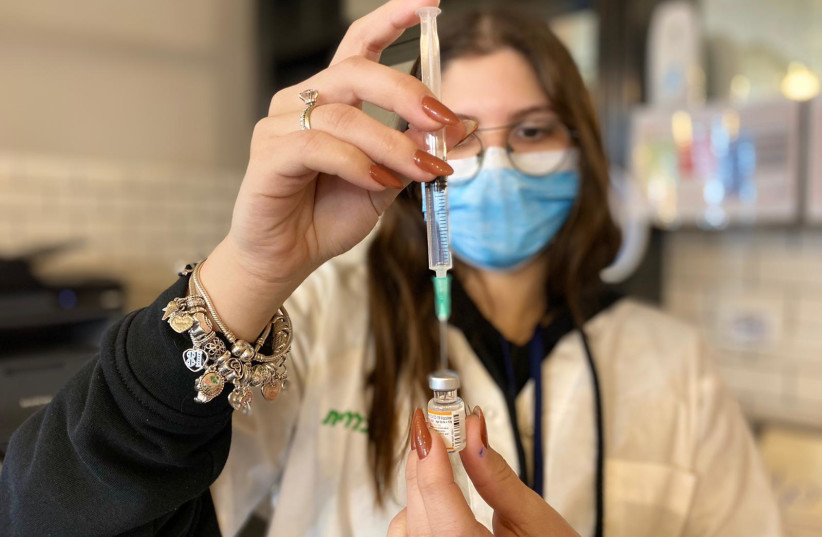Israel will allow people at least 60 years old and medical staff to receive a fourth dose of the coronavirus vaccine, Prime Minister Naftali Bennett said Sunday evening as Israel’s unprecedented surge in coronavirus cases continued.
The Pandemic Response Committee had already issued a recommendation to proceed with the new booster shot on December 21, but Health Ministry Director-General Nachman Ash decided to wait. Last week, he authorized the shot for immunosuppressed patients and residents of retirement homes, but not yet for the elderly.
“The decision was made based on the best professional considerations and after the Health Ministry consulted with experts,” Bennett said. Israel could see as many as 50,000 new cases a day in the upcoming days, or about five times more than what the country experienced in previous waves, he said.
To be eligible for the new booster, individuals over the age of 60 and medical staff will need to have received the third vaccine at least six months earlier.
Earlier in the day, Weizmann Institute of Science Prof. Eran Segal said between two and four million Israelis, more than 40% of Israel’s population, could end up being infected with the Omicron variant of the coronavirus within the next three weeks.

“At the national level mass infection is inevitable,” he wrote on Twitter. “Current restrictions are too weak in light of such a contagious virus.”
However, vaccines continued to be very effective against serious symptoms, Segal said.
“On a personal level you can defend yourself,” he said. “The vaccine and booster protect excellently from severe illness.”
Bennett said in spite of the infectiousness of the disease, those who are fully vaccinated can continue to go about their life more or less in a normal way, while the country is working to protect the vulnerable.
For this reason, the quarantine and testing policies for individuals exposed to the virus will change to face the increased numbers, he said. Over the past few days, many Israelis have had to wait hours in line for a test.
“We decided to exempt from quarantine individuals ages five and up after they are tested and found negative,” Bennett said. “The vaccine protects against serious illness and isolation.”
Asymptomatic individuals under the age of 60 will be able to undergo a rapid test instead of a PCR, Channel 12 reported.
Israel recorded almost 27,000 new cases in the past week, marking a 200% increase compared with the previous week.
On Friday, 5,500 new virus carriers were identified, or three times more than on the previous Friday, with almost 4% of the tests returning a positive result. An additional 4,200 cases were found on Saturday, with almost 100,000 tests processed, similar to those of previous weekdays. Both figures usually remain much lower over the weekend.
The number of patients in serious condition rose, but in a more limited way. As of Sunday night, there were 114 patients in serious condition. For most of the past two weeks the figure fluctuated between 80 and 90. On Saturday night, there were 101.
The current data in Israel seemed to confirm that Omicron is less violent than Delta, Segal said.
“Early yet encouraging data of fewer (~10) daily critically ill patients compared to Delta wave (~70) at similar case rates,” he tweeted. “If these ratios hold, we should be below past hosp. peak.”
While more than 40% of the new virus carriers identified in the past week had received a booster, most patients in serious condition were not vaccinated at all (88) or were vaccinated more than six months earlier (six), with 21 of them inoculated also with a booster, all of them over 60.
To encourage vaccination, the government decided that starting on Thursday, those who get jabbed with a first dose would immediately receive a temporary Green Pass, which gives access to several services and venues. It would be valid for one month.
Previously, individuals had to be vaccinated with both doses or with a booster for at least one week before receiving the document.
Earlier in the day, Ash said Israel might be on the verge of herd immunity.
“The price of herd immunity is very many infections, and that may be what will happen,” he told 103FM Radio. “The numbers need to be high to reach herd immunity; this is something that is possible.”
Ash also addressed the issue of what policies to implement in light of the surge in infections.
“The dilemma is in the face of many infections – whether to continue with the isolation policy [for children exposed to Omicron] or switch to another policy, for example, that vaccinated children can come [to school] pending daily tests,” he said. “These are things we are considering now.”
“We do not want to close schools,” Ash said. “It is a complex decision. We need to think about whether to allow learning with tests and vaccines or to go for a policy of moving to studies via Zoom.”
Also on Sunday, the Health Ministry announced it had signed a contract to buy the Molnupiravir antiviral treatment. The pill is intended to be administered to coronavirus patients with mild or moderate symptoms to prevent their deterioration. The treatment has proven to reduce hospitalizations and deaths by 30% and received the emergency-use approval from the US Food and Drug Administration last week.
At the same time, Israel started to administer the antiviral pill produced by Pfizer.
“The storm is reaching us,” Bennett said at the cabinet meeting earlier in the day.
“The policy and the steps that we will take will be adapted to the morbidity situation and the absorption capacity of the hospitals,” he said. “In parallel with the expected crowding at the hospitals, it must be kept in mind that the situation in which there are tens of thousands of verified cases a day is very difficult to manage logistically. These are numbers that neither we nor the world has known.”
